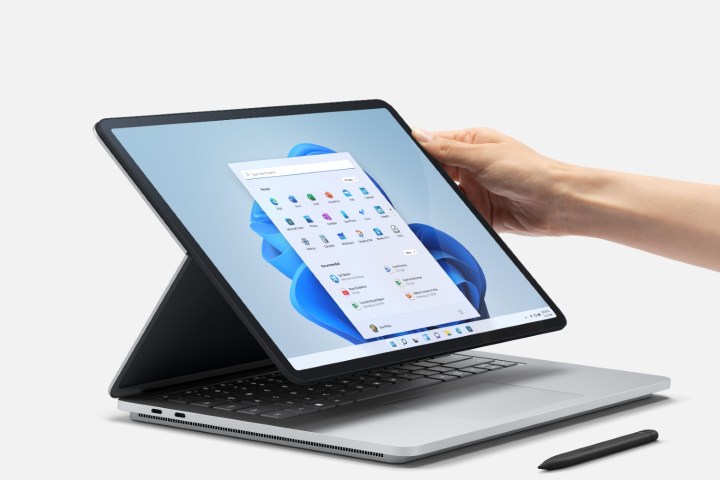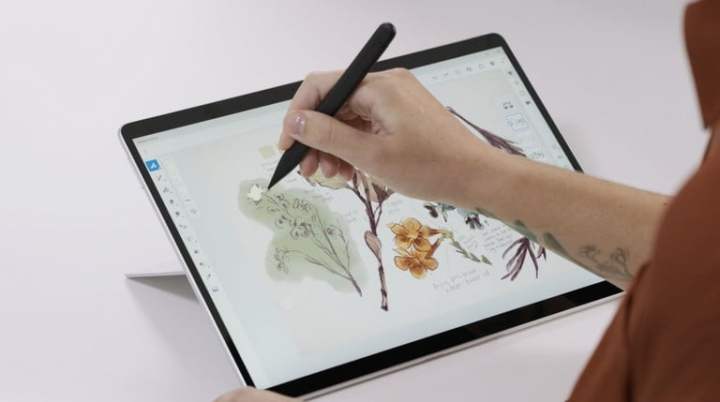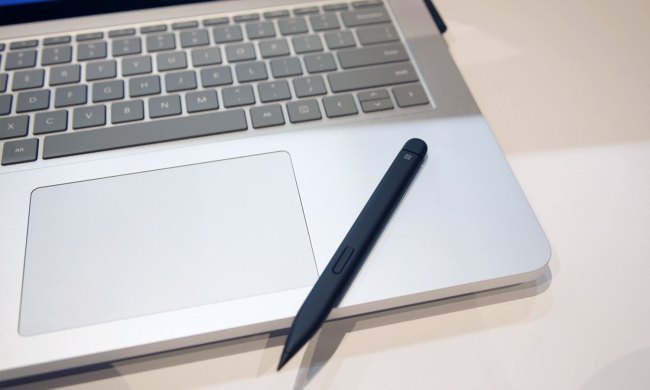Ahead of Microsoft’s fall Surface event, there was a lot of anticipation for what the company would announce. Not only is Microsoft’s hardware event arriving weeks ahead of the company’s debut of Windows 11, but it’s widely believed that the company’s Surface platform will serve as a launchpad for what consumers can expect for the next-generation operating system.
“Throughout our history as Surface, we have seen that the most meaningful experiences come from innovation at the intersection of hardware and software,” Microsoft said of the launch. “This idea was the catalyst for Surface — to build hardware that would not only be a stage for Windows, but push the platform and the ecosystem forward.”

Microsoft’s Chief Product Officer Panos Panay continued to emphasize how Surface is designed to adapt to each and every one of our needs. Here’s everything that Microsoft announced at its 2021 Surface event:
Surface Duo 2

Though the original Surface Duo phone wasn’t quite a mainstream success, Microsoft is applying its learnings to the Surface Duo 2. This year’s Duo 2 is an iterative update, improving on many of some of the pain points from its predecessor, while retaining the original’s dual-screen form factor that’s part of the Duo’s namesake.
You’re still getting a dual-screen form factor comprising two 5.8-inch displays that can be unfolded and combined to form an 8.3-inch PixelSense Fusion display that’s protected by Corning’s Gorilla Glass Victus, but this year, you’re also getting an all-modern Qualcomm Snapdragon 888 processor under the hood. This makes the Duo 2 competitive against modern Android flagships, like Samsung’s Galaxy Z Fold 3 5G, and Microsoft claims that its multitasking mobile device is capable of all-day battery life with its 4449mAh battery.

Another big improvement this year is the camera system — you’re getting a triple-camera array on the back, complete with a 16-megapixel ultrawide lens, a 12-megapixel wide camera, and a 12-megapixel telephoto lens that provides 2x optical zoom. Microsoft is also equipping the Duo 2 with a 12-megapixel front-facing camera for video calls. There’s even a glance bar on the hinge to give you access to the time and notifications without requiring you to open your device.
In terms of connectivity, there’s Wi-Fi 6 802.11ax support on this phone, as well as 5G connectivity with mmWave support in the U.S. The phone can be configured with 128, 256, or 512GB of storage, and all configurations ship with 8GB of LPDDR5 RAM. The phone is powered by Google’s Android 11 operating system with Microsoft’s tweaks. It supports enterprise-grade security with a fingerprint reader. And like most modern phones today, a power brick isn’t included in the box — only a USB-C charging cable will be bundled, though some versions in Europe will ship with USB-C earbuds as well. The Duo 2 will also support inking with Microsoft’s Surface pens.
Be sure to also dive in and read our Surface Duo 2 coverage to learn more.
Surface Laptop Studio

What was originally rumored to be called the Surface Book 4 is now officially known as the Surface Laptop Studio. It is Microsoft’s latest take on the convertible laptop form factor, combining the hinge from its Surface Pro line with its Surface Laptop line to result in a machine that resembles Apple’s iPad Pro with the new Magic Keyboard Cover.
Designed for creators, the notebook sports a 14-inch display and 120Hz refresh rate. The laptop design isn’t entirely new, however, as the midway hinge on the cover has been used by Acer for a few generations now and is known as the Ezel hinge on some of that company’s ConceptD laptops for professionals.

Providing power are Intel’s 35-watt 11th-Gen H-Series processors — topping out with an i7-1170H model — and either integrated Intel Iris Xe graphics or discrete Nvidia GeForce RTX 3050 Ti. Professional configurations can opt for an Nvidia GeForce RTX A2000 GPU instead, but that won’t be available to consumers.
New to the Surface lineup this year is support for Intel’s Thunderbolt 4 port, and two of those ports are present on this convertible, along with the traditional Surface Connect port for power and docking, as well as a 3.5mm headphone jack. Dolby Atmos is supported on the built-in speakers, and mechanical keys help make the keyboard feel more refined for pros. Inking is also supported, and Microsoft is pitching that this laptop will work with the new Surface Slim Pen 2.
The laptop is available for pre-order today, and pricing starts at $1,599.
Surface Pro 8

Microsoft boasts that the speed improvement of this year’s Surface Pro model makes it twice as fast as the outgoing edition. This year’s update delivers some serious performance improvements, and the company claims that the new Surface Pro 8 can handle 40% higher sustained CPU performance and 74% better graphics performance than the 7. Powering these new gains are Intel’s quad-core 11th-Gen Core i5 and i7 processors on the consumer release. Enterprise customers can choose between Core i3 and Core i7 configurations alongside optional LTE mobile broadband support. The convertibles come with Intel Iris Xe graphics, except for the base enterprise model that tops out with Intel UHD Graphics. Memory starts at 8GB and tops out with 32GB. It’s the most powerful Pro that Microsoft’s ever built, the company proclaimed.
Not all of the big changes are under the hood, however. There are some meaningful surface upgrades to the Surface Pro 8, including a better Pro display that’s 11% larger and 10.8% higher resolution. The Surface Pro 8 now ships with a 13-inch PixelSense Flow display with a resolution of 2,880 x 1,920 while retaining the line’s signature 3:2 aspect ratio.
The 120Hz refresh rate makes this tablet great for light gaming and creative edits of video projects on the go. The hallmark kickstand is still there — and it supports 165-degrees of tilt. The microphone, camera, and speakers are all improved. This year’s upgrade also adds Thunderbolt 4 support — a first for the lineup — to the Pro 8, making it compatible with eGPUs, so it can be used for AAA gaming with the right graphics card.

A big change this year is that there is a new keyboard cover for the Surface Pro 8 that houses and charges the built-in Slim Pen 2. It comes with a custom silicon to deliver haptics feedback when writing.
The Surface Pro 8 starts at $1,099 when it becomes available for pre-order today.
Surface Pro X

Unlike the Surface Pro 8, the Surface Pro X didn’t get much of an upgrade this year. Instead of building the latest processors into its Windows on ARM machine, Microsoft is instead focused on making the Pro X more accessible to more people by lowering the entry price. The lower base model now eschews ubiquitous LTE connectivity in favor of a Wi-Fi-only configuration and now starts at just $899.
The ARM-powered laptop runs on Microsoft’s custom SQ1 and SQ2 processors with integrated SQ Adreno graphics and ships with a 3:2 aspect ratio 13-inch PixelSense Display. Unlike Apple’s embrace of ARM for its M1-powered MacBook Pro and MacBook Air, Microsoft’s move to ARM has been a slower transition. However, improvements to ARM PCs in Windows 11 should help the situation quite a bit.
If you opt for an LTE configuration, Gigabit LTE is supported, and Microsoft is advertising up to 15 hours of battery life on “typical device usage.” The Surface Pro X is also compatible with the Surface Pro Signature Keyboard and Surface Pro Keyboard, the latter of which is also formerly known as Surface Pro X Signature Keyboard and Surface Pro X Keyboard. And like this year’s Surface PC lineup, the Surface Pro X is also compatible with Microsoft’s new Surface Slim Pen 2.
Surface Go 3

The Surface Go lineup is viewed as the affordable alternative to Microsoft’s premium Surface Pro, and this year’s Surface Go 3 is no exemption. Designed for students and with affordability in mind, the Surface Go 3 showcases the best of Windows 11 with optional LTE Advanced connectivity for ubiquitous access to the internet.
“It’s the fastest, most portable Go yet,” the company exclaimed.

Weighing in at 1.2 pounds, it sports a 10.5-inch display with a 3:2 aspect ratio screen, support for Dolby Audio through the built-in speakers, and studio microphones for audio and video chats. This year’s refresh comes with everything that’s loved about the lineup alongside a power bump — Microsoft claims that the new Intel Core i3 processor inside this year’s model delivers a speed boost of 60%. And priced at just $399 to start for the Wi-Fi edition — the 4G LTE models are coming later — the Go 3 expands Microsoft’s ambitions of competing against Chromebooks in the classroom.
Surface Slim Pen 2

Originally launched with the Surface Pro X, Microsoft is now bringing its Slim Pen to more models in its Surface computing lineup in the form of a new Slim Pen 2. This year’s Slim Pen 2 adds some new features, making it feel more intuitive, like writing on paper, the company claims. To achieve that, Microsoft added a new built-in haptic motor to the pen to recreate the pen-on-paper experience.
“Tactile signals is a new digital pen experience that uses the built-in haptic motor in Surface Slim Pen 2 to give you the same feeling you get with pen on paper when notetaking and drawing,” Microsoft stated of the new pen’s hardware. “Tactile signals can make it easy for you to know when you’ve successfully used natural gestures like circling to select and crossing out to delete in Microsoft Word or tools in Adobe Fresco.”

The new haptic feedback only works with the Surface Pro 8 and Surface Laptop Studio running Windows 11, Microsoft adds. The pen magnetically attaches to the devices or can be stowed and stored in a compatible keyboard cover. In addition to working with the latest Surface PCs announced today, it will work with older models as well.
Compatibility for the pen is listed as the Surface Pro 3 to Pro 8 models, the Pro X, the Surface Duo and Duo 2 smartphones, the Surface Hub 2S, all four generations of the Surface Laptop, the Surface Studio’s first and second generations, all three generations of the Surface Book, the Surface Laptop Studio, and all non-Surface devices that support Microsoft’s Pen Protocol (MPP). The pen comes with a side button, top button, and eraser.
Microsoft Ocean Plastic Mouse

Microsoft is also launching a new mouse that’s made from 20% recycled ocean plastic and comes in packaging made from 100% recycled materials. The Microsoft Ocean Plastic Mouse has a construction that’s described as “a breakthrough in materials technology that begins with the removal of plastic waste from oceans and waterways.”
The manufacturing process begins by harvesting plastics that are found in oceans and waterways. The material is cleaned and then turned into recycled pellets, which are then blended during the development of the mouse. In terms of technology, Bluetooth 5.0 is supported, and the mouse operates on the 2.4GHz frequency.

Range is described as up to 33 feet, and it operates on one AA alkaline battery that will last up to 12 months. Unfortunately, a rechargeable battery isn’t an option here despite the sustainability effort.
Surface Adaptive Kit

Designed for accessibility, the Surface Adaptive Kit is made in partnership with people with disabilities, Microsoft said. It was created from an effort inside the company’s Inclusive Tech Lab, and the kit makes devices accessible without a compromise on form or function. The kit includes keycap labels, bump labels, port indicators, and even device openers to help people with disabilities use their devices.
“From creatives and gamers to families and businesses of all sizes, these new Surface products have been designed to give our customers the versatility and power to focus on what matters most, allowing the technology to fade into the background,” Microsoft said. “These Surface devices have a different look and feel by design. We want them to be different, to stand out and serve as a canvas for the creative energies of our customers.”

The Surface Adaptive Kit will be available later this year, though pricing details were not immediately revealed.
Preorders for all the products announced will start today, Panay said, and everything will be available on October 5 alongside the launch of Windows 11.


